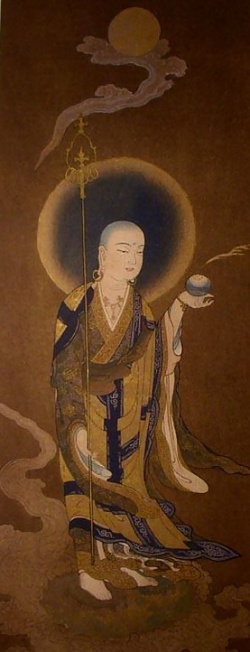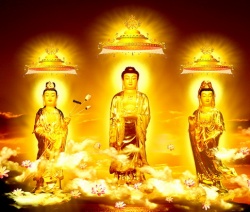Virtue
Sila (virtue, moral conduct) is the cornerstone upon which the entire Noble Eightfold Path is built.
The practice of sila is defined by the middle three factors of the Eightfold Path:
Practicing Buddhists voluntarily undertake a particular set of training rules appropriate to their life-situation:
- Lay men and women observe the Five Precepts (pañca-sila)
- Lay men and women doing intensive meditation practice (as on Uposatha days) observe the Eight Precepts (attha-sila)
- Novice monks (samanera) and nuns (samaneri) observe the Ten Precepts (dasa-sila)
- A fully-ordained monk (bhikkhu) follows the 227 rules of the Bhikkhu Patimokkha; a nun (bhikkhuni) would follow the 311 rules of the Bhikkhuni Patimokkha.
The rewards of virtue
(Ananda:) "What, O Venerable One, is the reward and blessing of wholesome morality?"
[The Buddha:] "Freedom from remorse, Ananda."
"And of freedom from remorse?"
"And of joy?"
"And of rapture?"
"Tranquillity, Ananda."
"And of tranquillity?"
"And of happiness?"
"Concentration, Ananda."
"And of concentration?"
"Vision and knowledge according to reality."
"And of the vision and knowledge according to reality?"
"Turning away and detachment, Ananda."
"And of turning away and detachment?"
"The vision and knowledge with regard to Deliverance, Ananda."
- — AN 10.1 (Nyanatiloka, trans.; from Path to Deliverance, pp. 65-66)
Five faultless gifts
"There are these five gifts, five great gifts — original, long-standing, traditional, ancient, unadulterated, unadulterated from the beginning — that are not open to suspicion, will never be open to suspicion, and are unfaulted by knowledgeable contemplatives & brahmans.
Which five?
"There is the case where a disciple of the noble ones, abandoning the taking of life, abstains from taking life.
In doing so, he gives freedom from danger, freedom from animosity, freedom from oppression to limitless numbers of beings.
In giving freedom from danger, freedom from animosity, freedom from oppression to limitless numbers of beings, he gains a share in limitless freedom from danger, freedom from animosity, and freedom from oppression.
This is the first gift, the first great gift — original, long-standing, traditional, ancient, unadulterated, unadulterated from the beginning —
that is not open to suspicion, will never be open to suspicion, and is unfaulted by knowledgeable contemplatives & brahmans...
"Furthermore, abandoning taking what is not given (stealing), the disciple of the noble ones abstains from taking what is not given.
In doing so, he gives freedom from danger, freedom from animosity, freedom from oppression to limitless numbers of beings.
In giving freedom from danger, freedom from animosity, freedom from oppression to limitless numbers of beings, he gains a share in limitless freedom from danger, freedom from animosity, and freedom from oppression. This is the second gift...
"Furthermore, abandoning illicit sex, the disciple of the noble ones abstains from illicit sex.
In doing so, he gives freedom from danger, freedom from animosity, freedom from oppression to limitless numbers of beings.
In giving freedom from danger, freedom from animosity, freedom from oppression to limitless numbers of beings, he gains a share in limitless freedom from danger, freedom from animosity, and freedom from oppression.
This is the third gift...
"Furthermore, abandoning lying, the disciple of the noble ones abstains from lying.
In doing so, he gives freedom from danger, freedom from animosity, freedom from oppression to limitless numbers of beings.
In giving freedom from danger, freedom from animosity, freedom from oppression to limitless numbers of beings, he gains a share in limitless freedom from danger, freedom from animosity, and freedom from oppression. This is the fourth gift...
"Furthermore, abandoning the use of intoxicants, the disciple of the noble ones abstains from taking intoxicants.
In doing so, he gives freedom from danger, freedom from animosity, freedom from oppression to limitless numbers of beings.
In giving freedom from danger, freedom from animosity, freedom from oppression to limitless numbers of beings,
he gains a share in limitless freedom from danger, freedom from animosity, and freedom from oppression.
This is the fifth gift, the fifth great gift — original, long-standing, traditional, ancient, unadulterated, unadulterated from the beginning — that is not open to suspicion, will never be open to suspicion, and is unfaulted by knowledgeable contemplatives & brahmans.
And this is the eighth reward of merit, reward of skillfulness, nourishment of happiness, celestial, resulting in happiness, leading to heaven, leading to what is desirable, pleasurable, & appealing; to welfare & to happiness."
- — AN 8.39
Five blessings
"Five blessings, householders, accrue to the righteous person through his practice of virtue: great increase of wealth through his diligence; a favorable reputation;
a confident deportment, without timidity, in every society, be it that of nobles, brahmans, householders, or ascetics; a serene death;
and, at the breaking up of the body after death, rebirth in a happy state, in a heavenly world."
- — DN 16
Admirable friends encourage the development of virtue
"And what is meant by admirable friendship?
There is the case where a lay person, in whatever town or village he may dwell, spends time with householders or householders' sons, young or old, who are advanced in virtue.
He talks with them, engages them in discussions. He emulates consummate conviction [in the principle of kamma] in those who are consummate in conviction, consummate virtue in those who are consummate in virtue, consummate generosity in those who are consummate in generosity, and consummate discernment in those who are consummate in discernment.
This is called admirable friendship."
- — AN 8.54
Recalling your own virtues
"Furthermore, there is the case where you recollect your own virtues:
They are untorn, unbroken, unspotted, unsplattered, liberating, praised by the wise, untarnished, conducive to concentration.'
At any time when a disciple of the noble ones is recollecting virtue, his mind is not overcome with passion, not overcome with aversion, not overcome with delusion.
His mind heads straight, based on virtue. And when the mind is headed straight, the disciple of the noble ones gains a sense of the goal, gains a sense of the Dhamma, gains joy connected with the Dhamma.
In one who is joyful, rapture arises.
In one who is rapturous, the body grows calm. One whose body is calmed experiences ease. In one at ease, the mind becomes concentrated."
- — AN 11.12
Practice the precepts — and support others' practice, too
"Monks, these four types of individuals are to be found existing in the world.
Which four?
The one who practices for his own benefit but not for that of others.
The one who practices for the benefit of others but not for his own.
The one who practices neither for his own benefit nor for that of others.
The one who practices for his own benefit and for that of others.
"And how is one an individual who practices for his own benefit but not for that of others?
There is the case where a certain individual himself abstains from the taking of life but doesn't encourage others in undertaking abstinence from the taking of life.
He himself abstains from stealing but doesn't encourage others in undertaking abstinence from stealing.
He himself abstains from sexual misconduct but doesn't encourage others in undertaking abstinence from sexual misconduct.
He himself abstains from lying but doesn't encourage others in undertaking abstinence from lying.
He himself abstains from intoxicants that cause heedlessness but doesn't encourage others in undertaking abstinence from intoxicants that cause heedlessness.
Such is the individual who practices for his own benefit but not for that of others.
"And how is one an individual who practices for the benefit of others but not for his own?
There is the case where a certain individual himself doesn't abstain from the taking of life but encourages others in undertaking abstinence from the taking of life...
(similarly with the precepts on stealing, sexual misconduct, lying, and intoxicants). Such is the individual who practices for the benefit of others but not for his own.
"And how is one an individual who practices neither for his own benefit nor for that of others?
There is the case where a certain individual himself doesn't abstain from the taking of life and doesn't encourage others in undertaking abstinence from the taking of life...
(similarly with the precepts on stealing, sexual misconduct, lying, and intoxicants). Such is the individual who practices neither for his own benefit nor for that of others.
"And how is one an individual who practices for his own benefit and for that of others?
There is the case where a certain individual himself abstains from the taking of life and encourages others in undertaking abstinence from the taking of life...
(similarly with the precepts on stealing, sexual misconduct, lying, and intoxicants). Such is the individual who practices for his own benefit and for that of others.
"These are the four types of individuals to be found existing in the world."
- — AN 4.99
Source
"Virtue: sila", edited by Access to Insight. Access to Insight, 12 February 2012, http://www.accesstoinsight.org/ptf/dhamma/sila/index.html . Retrieved on 10 June 2013.




